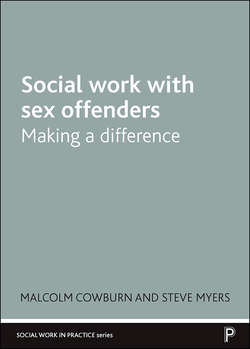Читать книгу Social Work with Sex Offenders - Cowburn Malcolm - Страница 30
На сайте Литреса книга снята с продажи.
Victim perspectives
ОглавлениеThe perspectives of victim-survivors of sex crimes are primarily concerned with the impact of offending on them personally. There are an increasing number of accounts of being groomed available on the internet (eg Surviving Therapist Abuse, 2009). Briere and Elliott (2003), in a study of 935 subjects, identified that 49.6% were male and 50.4% were female, and the mean subject age was 46 years, with a range of 18 to 90. They found that childhood sexual abuse is a significant risk factor for a range of psychological and psychiatric disorders and problems, including depression, phobias, obsessive-compulsive disorder, panic disorder, post-traumatic stress disorder, sexual disorders and both suicidal ideation and suicide attempts. The nature of the abuse – intrafamilial or extrafamilial – did not affect psychological outcome, neither did the sex of the abuser. Similarly, Deering and Mellor (2011) note that the consequences of sexual abuse by women on their victims are similar to when the offender is a man, including depression, substance abuse (Tsopelas et al, 2012) and self-harm (Denov, 2004). Deering and Mellor (2011), talking with both male and female survivors of female sexual abuse, found high levels of self-reported anger and aggression, difficulties with intimate relationships, and psychosexual malfunctioning, all of which are similar to the consequences of being abused by a man.
However, it is important to recognise that not all victims speak about their experiences. Kenny and McEachern (2000) and Futa et al (2001) have noted that ‘sexual abuse’ remains a concept constructed through discourses that have usually been in English, and that have generally explored the experiences of white children in North America, Western Europe and Australasia, rather than those of children in Asia, Africa and South America, or in minority communities in the West. Additionally, cultural notions of shame and modesty have been shown to inhibit South Asian victims from speaking about their experiences (Gilligan and Akhtar, 2006). Moreover, Valentine (2008) has noted that language is a gendered phenomenon, and in South Asian languages, it reproduces the gendered social order, thus restricting or preventing some victims from speaking authentically about their experiences. The challenge in understanding sex offending is to consider the many academic disciplinary perspectives alongside the authentic language of victim-survivors.
